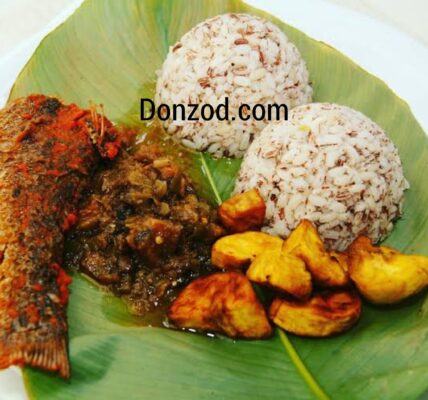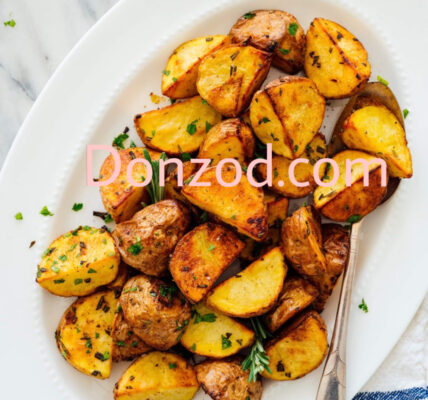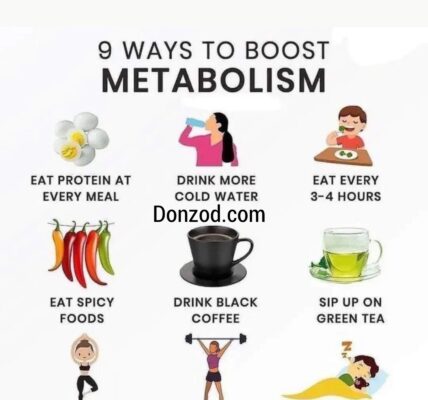Vegetables are often overlooked as sources of protein, yet many Nigerians still believe that only meat, fish, or eggs provide this essential nutrient. Some of the vegetables we eat every day carry good amount of protein that help our body to grow, repair tissue and stay strong.
If you want to reduce meat for health or money reason, or maybe you just like more plant food, it is useful to know which local vegetables bring the highest protein.
Protein is one of the three big nutrients our body needs daily. Most adults need about 50 to 60 grams of protein depending on work and age.
Vegetables alone might not give all the amino acid in one meal but when you mix different types you can still meet your body needs.
1. Ugu (Fluted Pumpkin Leaves)
Ugu is one of the most popular vegetable in Nigeria. People use it in soups like egusi and ogbono. One cup of cooked ugwu can give around 3 grams of protein.
That may look small but when you eat enough portion it add up. Ugwu is also rich in iron and vitamin A which is good for blood and eyes. Cooking it lightly keeps the nutrients. Some people boil too long which is not good because the leaves turn dark and lose vitamins.
2. Ewedu
Ewedu is loved mostly in Yoruba homes, often served with amala and gbegiri. It contains about 4 grams protein in a cooked cup. It is slimy after cooking but that slimy texture also help digestion.
Ewedu also provides calcium and vitamin C. Add little crayfish or pepper for nice flavour. If you blend it too smooth it can lose some fiber, so just cook gently.
3. Green Amaranth (African Spinach)
Amaranth leaves which many call green, is common in markets across local markets in Nigeria. It gives around 3 grams protein per cup when cooked and is rich in iron and folate.
You can fry it with tomato and onion for quick side dish or mix with yam porridge. People sometimes throw away the tender stems but they are also edible and have fiber.
4. Garden Egg Leaves
Garden egg leaves are often used for sauce or as side with boiled yam. They are good source of protein, about 2 to 3 grams per cooked cup, and provide antioxidants that support liver and kidney. Some people eat them raw but washing well is important to remove dirt and tiny insects.
5. Bitter Leaf
Even though bitter leaf is known for its bitter taste, it is loaded with nutrients and around 3 grams of protein per cup cooked. It is popular in onubu soup among the Igbo.
Washing properly to reduce the bitterness is key. Bitter leaf also has medicinal value, some say it help to lower blood sugar though you should not rely on it alone for treatment.
6. Okra
Okra is a vegetable many Nigerians love for soups. It contain about 3 grams of protein per cup and is rich in fiber which help stomach health.
Okra soup is easy to cook and can be combined with fish or beans for extra protein. Try not to overcook because it becomes too soft and lose some nutrients.
7. Beans (Cowpea)
Beans is more of a legume but many Nigerians count it as vegetable in meals. Cowpea (black eyed beans) is a powerhouse with about 15 grams protein per cooked cup.
Moimoi, akara or plain beans porridge are excellent ways to enjoy it. Beans also have iron and fiber. Soaking beans before cooking reduce gas and make it cook faster.
8. Green Peas
Fresh or dried green peas are another good source of plant protein, about 8 grams per cooked cup. You can add peas to fried rice, jollof or even swallow dishes for extra nutrients. Frozen peas also work fine if you cannot get fresh ones.
9. African Yam Bean
Though not as common as cowpea, African yam bean is rich in protein around 13 grams per cup cooked. It can be boiled like regular beans or mixed with maize to make a local porridge. Many people overlook it but it is tasty and filling.
10. Locust Beans
Locust beans are used more like a seasoning but still add protein. Fermented locust beans have about 12 grams protein per 100 grams and give unique flavour to soups like efo riro or egusi. Even small quantity contributes nutrients.
Combining Of Vegetables for the Best Protein Result
One vegetable by itself might not give all essential amino acids. But when you combine different vegetables or eat them with grains like rice, millet or yam you can make a complete protein. For example, beans and corn mixture in moi moi or pap with milk provide better amino acid balance.
Adding groundnut or sesame seed to vegetable dishes also boost protein and healthy fat. Combining different kinds of vegetables at a time is the secret. Do not just eat ugu every day, mix with other greens and legumes.
Tips on How to Increase Protein from Vegetables
- Eat bigger portions of vegetables as vegetables have low calories so you can eat more without worry.
- Cook the vegetables slightly as overcooking it may kill the nutrients. Quick steaming or stir fry is best.
- Include legumes such as beans, peas, African yam bean all give serious protein punch.
- Snack smartly because roasted groundnut with sliced cucumber is better than biscuit if you need protein snack.
Importance Of Plant Proteins
Plant proteins are naturally low in saturated fat and have no cholesterol, which is good for heart health.
They also bring fiber that helps digestion and control weight. People who eat more plant protein often have lower blood pressure and less risk of diabetes.
But if you depend only on plant food, make sure to get enough calories and vitamin B12.
B12 mostly comes from animal source so fortified cereal or supplement might be needed for strict vegetarians.
Typical Example of Daily Plant Protein Meals
Breakfast, eat beans and corn moi moi with a side of fresh ugu smoothie.
Lunch eat efo riro with a mix of amaranth and garden egg leaves, served with brown rice.
Dinner you can pair okra and ewedu soup with small fufu and roasted groundnut topping.
This kind of menu can give nearly 60 grams of protein if portion is right.
Conclusion
Eating vegetables rich in protein is not as hard in Nigeria as many think. From ugu and ewedu to beans and African yam bean, the market is full of choices that fit every pocket.
Mixing different greens with legumes ensures you reach your daily protein needs while also getting vitamins, minerals and fiber.
It also help the environment because plants use less water and create less waste than animal farming. So when you cook a big pot of beans with bitter leaf or enjoy a plate of peas fried rice, you are feeding your body and protecting the earth at same time.




